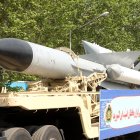U.S. approves $20 billion arms sale to Israel
Among other things, the shipment includes 50 F-15 fighter jets, medium-range air-to-air missiles, 120 mm tank ammunition and high-explosive mortars.

Netanyahu received a standing ovation at the US Congress / Roberto Schmidt
The United States approved the sale of $20 billion in arms for Israel, amid growing tensions in the Middle East and the latent threat from Iran against the Jewish State. However, this item will not be delivered in the short term, but is designed to "help Israel build up its military capability over the long term."
The State Department recently notified the Congress of the transaction, which includes 50 F-15 fighter jets, advanced medium-range air-to-air missiles, 120mm tank ammunition, high-explosive mortars and tactical vehicles.
"The United States is committed to the security of Israel, and it is vital to U.S. national interests to assist Israel to develop and maintain a strong and ready self-defense capability. This proposed sale is consistent with those objectives," the State Department said in a statement.
As reported by The Associated Press, "the contract also includes the sale of 50 new Boeing aircraft, upgrade kits for Israel to modify its existing fleet of two dozen F-15 fighter jets with new engines and radars." The first deliveries of this purchase are expected to materialize in 2029.
Regarding the tense situation in the Middle East, Defense Secretary Lloyd Austin, ordered the USS Abraham Lincoln carrier strike group to sail faster to the region. At the same time, he arranged for the dispatch of an extra submarine.
Major General Pat Ryder, Pentagon press secretary, wrote a statement detailing that Austin spoke with his Israeli counterpart, Yoav Gallant, to whom he reiterated the U.S. commitment "to take all possible measures to defend Israel and emphasized strengthening the posture and capabilities of U.S. military force throughout the Middle East in light of growing regional tensions."



























